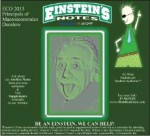USF fights to keep notes out of sellers’ hands

A Florida note-taking company and USF officials are battling over whether students can sell their notes, which the University claims violates school policy.
The University said that Einstein’s How I got an A, which hires USF students as independent contractors and pays them a “scholarship” to take notes in class, breaks a portion of USF’s Policies and Procedures Manual that bars students from selling class notes.
The owner of Einstein’s How I got an A insists, however, that he’s not infringing on copyright law or breaking University procedure by employing students as note-takers, and said past legal decisions support his argument.
In 1996, the University of Florida sued KPB Incorporated, which owned another note-taking company, accusing it of copyright infringement by selling student-authored study packets to the student body at large.
After a lengthy legal battle, the case was appealed to 11th District Federal Court. The court ruled against UF, stating that the “contents of courses at public universities, delivered in public settings, are not protected by copyright law and are not owned by the university.”
Tom Bean, owner of Einstein’s How I got an A note-taking service has cited the 1996 case as his defense against USF’s Policies and Procedures Manual. Although Bean has been operating a separate branch of Einstein’s at UF for the last three semesters, the company’s USF branch has come under fire by professors, the Division of Student Affairs and the University’s General Counsel.
While the Policies and Procedures Manual states that “notes, recordings, handouts and other material provided by the instructor cannot be exchanged or distributed for commercial purposes,” Bean insists that his company and employees have done nothing wrong.
“All of our notes are student-authored, we’re not taking the professors’ lectures word-for-word,” Bean said. He described his company as a student scholarship program. “We reimburse the students the cost of the class and pay them a 5 percent commission on the sale of their notes.”
The company’s Web site, howigotana.com, features a sample study guide for Principles of Macroeconomics, taught by David Denslow, an economics professor at UF. Links throughout the guide lead students to definitions of key terms from other universities, Wikipedia and JSTOR.
Torey Greenwald, 20, has been taking notes for Einstein’s at UF for the past two semesters and praises the company for the benefits it offers to students.
“I have Bright Futures but I still need money for rent and all of my other expenses,” she said. “They can go to class, absorb the material and participate in discussion. Without the notes, students are too busy trying to make sure they have everything written down.”
University Spokesman Ken Gullette said USF stands by its manual.
“It’s not our job to say whether or not they should be in business, but University policy prohibits the sale of class notes,” he said.
About 18 USF students were prepared to work with Einstein’s during this semester, Bean said, but many of them decided not to become note takers after the first week of class, fearful of repercussions from the University or their professors.
Although there are no specific penalties in place for students who sell their notes, Bean said that students have been threatened with plagiarism, suspension, expulsion or legal action from professors.
“I lost almost all of my note-takers for this semester,” he said. “Most of them were intimidated by professors and it’s been torturously interfering with my ability to do business on campus.”
A series of e-mails between Bean and Joanne Adamchak, associate general council for USF, confirms that the University will enforce its policy prohibiting the sale of notes for commercial purposes. Bean has asserted that, as a USF alumnus, he has the best interest of the students in mind.
“We’re providing a great service for the kids. I wish there was something like this when I was in school,” he said.
Combating the sale of notes for commercial use is not exclusive to Florida.
In “Resisting the Commodification of Education,” an article by Mathieu Deflem, associate professor of sociology at the University of South Carolina, he claims that universities across the country have developed policies to deter students from selling their class notes. While some policies are similar to USF’s, universities like Harvard, Yale and Princeton base their standards on academic honesty. Harvard’s policy states that, “students who sell lecture or reading notes, papers, or translations or who are employed by a tutoring school or term paper company… may be required to withdraw.”
Although no legal action has been taken by either Bean or the University, legal counsel for both parties have had regular correspondence and have yet to come to an agreement.







